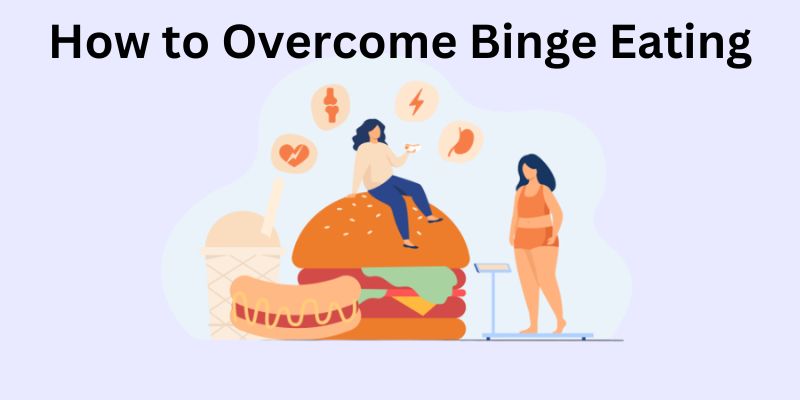Do you overeat, eating far more than your body needs in one sitting? If so, know that you're not alone. Binge eating is an issue for many individuals and often stems from underlying emotional problems or triggers like stress and anxiety.
Fortunately, several strategies can help manage binge eating behaviors so you no longer have to feel overwhelmed or ashamed about it.
In this blog post, we'll explore some of the causes behind why people binge eat and natural remedies and steps to take to overcome this habit.
Acknowledge your Emotions and Stressors
It is important to understand why you are engaging in the behavior to take control of your binge eating. Take a moment to think about what could be triggering these episodes of overeating and consider different stressors that may be playing a role. Emotional eating can often be caused by feeling overwhelmed or anxious, so being mindful of your feelings and the situations which could be leading to these cravings is key to learning how to overcome binge eating.
Once you have identified any underlying stressors, developing a plan for dealing with them is important. Make sure you take time and engage in self-care activities such as yoga, meditation, or journaling. Talking to a friend or therapist can help you process your feelings positively and constructively.
Lastly, it is important not to engage in negative self-talk or feelings of guilt after binge eating. Instead, try to focus on the positive steps that you can take toward overcoming this behavior in the future. With patience and understanding, you can learn how to overcome binge eating.
Build a Support System

Having a strong support system to rely on when dealing with binge eating can do wonders for overcoming the habit. Contact family and friends you feel comfortable talking to about your struggles. Forming meaningful relationships with people who understand your struggles can provide comfort and guidance in times of difficulty. Talk to them about your feelings; they can provide the necessary support to stay on track.
If needed, seek professional help, such as talking to a therapist or dietitian specializing in eating disorders. A healthcare professional can provide strategies tailored towards overcoming binge eating and point you in the right direction for further help. Building a strong support system is essential for managing and overcoming binge eating.
Create an Eating Schedule
Creating an eating schedule is a great way to help combat binge eating. It’s important to have regular meals throughout the day and avoid skipping meals, as that can lead to overeating later. When creating your meal plan, also consider what times are convenient for you to eat during the day, and if necessary, set reminders or alarms so that you can stick to your eating schedule.
Remember that the meals don’t have to be big or elaborate - think about what works best for you and plan accordingly. If necessary, set aside some time each week to meal prep so you have healthy meals throughout the day. Planning can be a great way to avoid the temptation of binge eating.
By establishing an eating schedule and meal plan, you can better control your eating habits and achieve a healthier lifestyle. So please try it - it may be the key to overcoming binge eating.
Choose Healthy Alternatives

Making small, healthy swaps in your diet can help you break the binge eating cycle. Choose fresh fruits and vegetables as snacks whenever possible instead of processed foods like chips and candy. If you crave something sweet, try a fruit or dark chocolate instead. Replace sugary drinks with water or herbal tea to help you stay hydrated and stave off cravings. Eating a balanced diet of nutrient-dense foods can also help reduce your urge to binge eat.
In addition, make sure to include plenty of protein in your meals and snacks. Protein helps keep you fuller for longer, so getting enough throughout the day is important. Add lean meats, eggs, nuts, and seeds to your meals for a protein boost. This can help make cravings less intense and reduce the urge to turn to unhealthy snacks.
Finally, it’s important to practice portion control when trying to break the habit of binge eating. Eating smaller portions more often throughout the day can help you feel full without overdoing it. When you snack, measure out single servings to prevent overeating. This way, you can still enjoy all your favorite snacks in moderation without going overboard.
Practice Mindful Eating
Mindful eating is a form of mindful meditation that helps to reduce overeating and binging. It involves focusing on the present moment and tuning into your body’s physical cues of hunger and satisfaction. To practice mindful eating, you should take at least 20 minutes for each meal or snack, put away any distractions (like phones or TVs) and focus on each bite of food.
Notice the texture, temperature, flavors, and aromas in your meal. Pay attention to how much you’re eating and when you feel full. This will help you remember what, how much, and why you’re eating. Being mindful while eating can also help to prevent you from eating out of boredom or stress.
FAQs
How do I stop the urge to binge eat?
The best way to stop the urge to binge eat is to create a healthy eating schedule and practice mindful eating. Acknowledge your emotions and stressors, build a support system, swap processed snacks for healthier alternatives, and take breaks from restrictive dieting if feeling deprived.
How do I get rid of binge?
To get rid of binge eating, start by understanding why you need to binge eat and identify any underlying stressors that contribute to it. Reach out for help from family, friends, or a healthcare professional when needed. Establish regular eating times throughout the day and practice mindful eating.
What triggers a binge?
Common triggers for a binge can include stress, boredom, feeling overwhelmed, or being deprived of certain foods. Knowing your triggers and striving to find healthier coping mechanisms is important.
Conclusion
In conclusion, it can be hard to overcome the habit of binge eating. However, by acknowledging your emotions and stressors, building a supportive environment with family and friends or help from a healthcare professional, setting an eating schedule, choosing healthy alternatives, and practicing mindful eating, you can take control of how you approach food. No matter the progress made in your recovery journey, remember that change takes time, and there is no timeline for making these changes. Progress over perfection.




